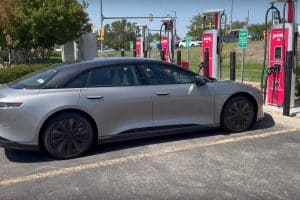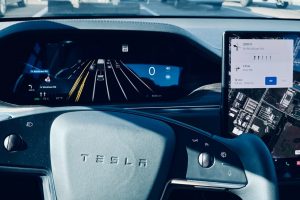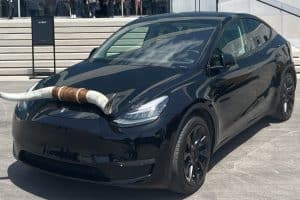Key Points
- 🚗 Tesla plans to manufacture a $24,000 car in India and is ready to invest in building a factory in the country with an annual production capacity of half a million vehicles.
- 🇮🇳 India has surpassed China as the most populous nation and Tesla aims to tap into the Indian market, which is now the fourth largest new car market in the world.
- 🏭 The factory in India is expected to serve as an export base for Tesla to ship cars to other Asian countries.
- 💰 The starting price of the vehicles manufactured in India is reported to be 2 million rupees ($24,401), but it is unclear which vehicle Tesla has in mind.
- ⚡ India is making efforts to boost electric vehicle (EV) adoption, with Tata Group investing in a lithium-ion battery cell factory and the discovery of large lithium reserves in the country.
- 🌍 Tesla’s presence in India could contribute to the transfer of technical skills and help India become one of the world’s leading economies.
- 🤝 The partnership between Tesla and India is seen as a win/win, and there is anticipation about the affordable vehicle Tesla plans to manufacture in India and its potential availability in the US.
India has surpassed China as the most populous nation in the world. Tesla has a gigafactory in China but none in India. India and China have had a number of disputes over the years, and Indian Prime Minister Modi has told Tesla in no uncertain terms that its Chinese-made automobiles are not welcome in his country. Negotiations have been on again/off again between Tesla and India for several years, with little forward progress being made. India imposes an import duty of up to 100% on vehicles manufactured in other countries.
In June, Elon Musk tore himself away from his chores as the owner of T*itter to visit with the Indian prime minister personally in the US, after which he pledged to begin manufacturing Tesla automobiles in India “as soon as humanly possible.” And why not? India is now the fourth largest new car market in the world, and yet Tesla — which is committed to promoting the EV revolution in every nation on Earth — has virtually no presence there.
After the meeting, Modi tweeted, “Great meeting you today @elonmusk! We had multifaceted conversations on issues ranging from energy to spirituality.” For his part, Musk said he planned to visit India personally next year.
Now just a few weeks later, Reuters reports that Tesla is ready to invest in India by building a factory there that would have an annual production capacity of half a million vehicles. The report was first published by the Times of India and cited government sources. Those sources also claim that Tesla intends to use the factory in India as an export base to ship cars to other Asian countries.
A team from Tesla went to India in May for preliminary discussions with officials in that country about what incentives might be offered by the government for automobile and battery manufacturing, according to Reuters.
“Tesla has come to us with an ambitious plan and we are confident the movement will be positive this time around, especially as it involves both local manufacturing and exports,” sources said. In fact it appears Tesla intends to start by exporting cars first in order to accurately measure the demand in Asian markets.
A Tesla Factory In India
Building a new Tesla factory in India is good news, but here’s the real meat in the stew: According to insiders with knowledge of the talks that have been going on since May, the starting price of the vehicles manufactured in India will be 2 million rupees, which translates at today’s exchange rate to $24,401. Tesla does not currently offer a car at the price, so it is unclear at the moment what vehicle Tesla has in mind.
There have been rumors and vague statements floating around for a year of more about a so-called Model 2 or Model C or call it what you want that will sell for less that $25,000. Although, Tesla has been very tightlipped about how far along such a vehicle is, and when exactly it may find its way into production. Some observers think the new factory in Mexico will be the first to build such a car, and that it could do so next year. If that’s the case, what about India too?
By the way, if that price seems low, there are several electric cars available to customers in India that are less expensive. The MG Comet sells for around $12,000 and the Tata Nexon EV lists for around $18,000. At the present time, the Tata is the best selling electric car in the country.
The Indian commerce and industry ministry is leading the talks with Tesla and hopes to put together a “good deal” while maintaining a level playing field, as talks now involve both local manufacturing and exports, according to local media sources.
EV Minerals In India
As we reported last month, prime minister Modi was a staunch advocate for electric vehicles a few years ago. He even claiming that India would be the first country to reach 100% electric vehicles. Since those grand pronouncements, India hasn’t done much to actually stimulate a lot of EV adoption. Perhaps things are changing, though.
Indian manufacturing powerhouse Tata Group is now making a big move into the space, reportedly investing 130 billion rupees ($1.58 billion) into a lithium-ion battery cell factory in the country. At the moment, only 1% of Indian auto sales are EV sales, but Tata Motors is the leader in the sector.
That battery factory won’t be coming online any time soon, however. Construction is scheduled to begin sometime in next 3 years. It is slated to have an annual production capacity of 20 GWh, with the possibility of increasing that to 40 GWh in a few years. The Tata battery factory will be located in Sanand, in northern Gujarat.
There was big news about battery raw materials in India recently. A large supply of lithium — almost 6 million tons — has been discovered in the states of Jammu & Kashmir, and the government is expected to begin auctioning off the mining rights to those reserves later this year.
The reserves, confirmed earlier this year, have placed India among the top five countries for lithium reserves in the world. The reserves are said to have a high purity and are graded at 500 parts per million compared to the normal grade of 220 parts per million.
India’s minister for transportation has expressed optimism about the country’s improved prospects as an EV powerhouse following conformation of the reserves’ purity and leading to claims that India could become the largest EV manufacturer in the world using them. The Indian government aims to achieve a 30% share of electric vehicles in private cars, 70% in commercial vehicles, and 80% in two- and three-wheeled vehicles by 2030.
The Takeaway
India may be the largest country by population, but it lags far behind other large countries in terms of manufacturing prowess. By opening the door to Tesla, it could begin the transfer of technical skills it needs to become one of the world’s leading economies. One thing we can be fairly certain of is that it won’t take Tesla three years to get a factory built and into production.
This is a win/win for Tesla and India, the proverbial match made in heaven. We can’t wait to find out what sort of vehicle the company plans to manufacture there and whether it will arrive one day in the US, where prospective EV purchasers are waiting anxiously for cars that are affordable.





